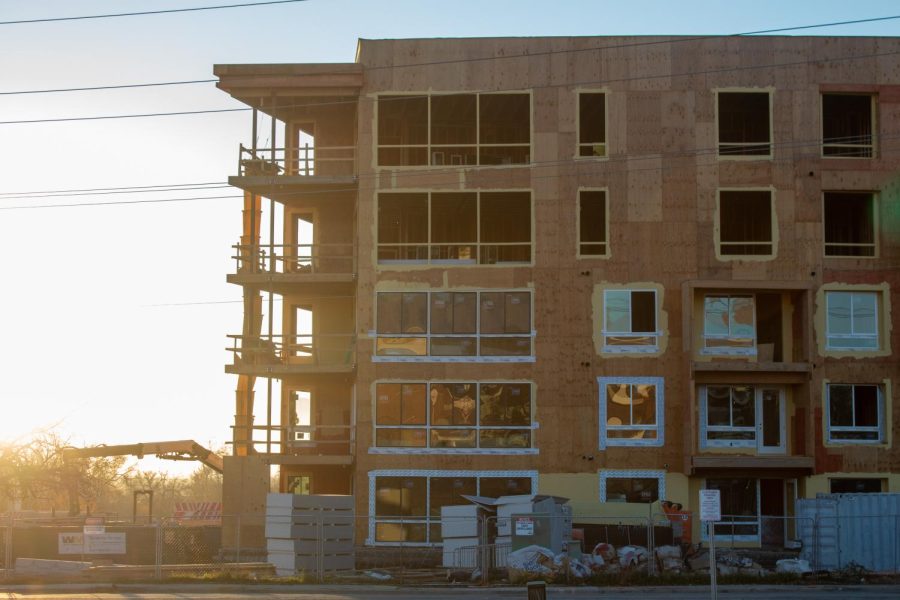Linnabary: Utah is a Growing State for a Reason
New apartments being built next to Brickyard Plaza as the population continues to increase in Salt Lake City on Nov. 28, 2021 . (Photo by Langley Hayman | The Daily Utah Chronicle)
December 8, 2021
America is an ever-changing nation, and a part of the change is shifting populations in our states. In the 2020 Census, Utah was found to be one of the fastest-growing states in the country. The state saw a massive population boom of 17.6% between 2010 and 2020, growing by over half a million. In 2020 alone, 25,256 people moved to Utah. Our economy and education are among the reasons why Utah is growing.
Utah has many pull factors that have drawn people to it. Utah has the number-one ranked economy in the country, according to U.S. News and World Report. We are experiencing 2.5% job growth with low cyclical unemployment.
The secret to Utah’s success is gearing our public policy toward economic growth. Utah’s tax policies are more business-friendly, with a flat 4.95% corporate and individual income tax rate. It is also a right-to-work state, meaning one cannot be compelled to join a union — all while still having some of the best health outcomes in the country.
Utah also has exceptional schools, achieving high results at a low cost to taxpayers, only spending $8,014 per student in 2019. While no longer having the lowest per-student spending in the nation, Utah still sits at a respectable place being well below the national average of $13,187. To the same tone, Utah’s entire fiscal house is in order. During the pandemic, the state was so fiscally responsible that the majority of its coronavirus stimulus money fueled a massive budget surplus rather than going to other projects.
This is all in sharp contrast to states seeing massive population drops, like California. California has consistently received low marks for its financial habits, with the Mercatus Center at George Mason University ranking it at number 42 in the entire nation for fiscal health. And they have some of the highest taxes in the nation. In the Golden State, all capital gains are taxed as income, meaning capital gains taxes will run between 1% up to 13.3%, depending on your income.
Poor fiscal health combined with massive taxes on income and capital gains undeniably makes California a less desirable place to live by financial means, especially when coupled with the major homelessness crisis in the state. There are now nearly 60,000 homeless people living in Los Angeles County, a 12% increase from last year. According to the Wall Street Journal, “in San Francisco, the number rose 17% while Alameda County, which includes Oakland, saw a 43% increase. Homelessness grew 42% in San Jose over the past two years and 31% in Santa Clara County, the heart of Silicon Valley.” This is all while we have seen a reduction in homelessness nationwide. All California has done in response to this is throw billions of tax dollars at the issue without addressing the real cause. No one wants to live in an urban center full of people without homes. Understandably, people are leaving in droves.
What is perhaps causing California’s move-out crisis more than anything else is the cost. California is consistently ranked as one of the most expensive states to live in. In California, the biggest purchase most people make, a house, is outrageously expensive. The median home price in Los Angeles, California, is $918,443, up 16.4% since last year. While various factors contribute to the outrageous price of homes, one gloating and uniquely California issue is the red tape. Regulations like the California Environmental Quality Act passed in the 1970s, and restrictive zoning laws make building affordable homes and new construction tedious and expensive. In response, existing homes are in high demand, driving up prices everywhere. This has caused so much frustration within the state that purchasing a home is not worth pursuing. Instead, many decide to pack their bags and move to states like Utah.
At the University of Utah, California residents make up the most significant out-of-state undergraduate student population. For many after graduation, they will have to decide where to settle down. As an out-of-state student, do you move back home to California or stay in Utah?
Stay in Utah. Yes, Utah has its flaws, but when weighing costs and benefits, it’s undeniably a great state to lay down roots, build a career and a family. As an out-of-state student, I plan on staying in Utah after I graduate, and you should too.









